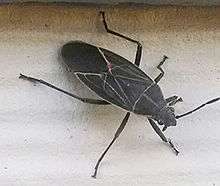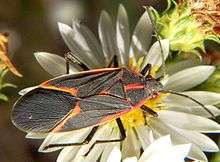Boisea
Boisea is the least speciose genus of the soapberry bug subfamily. Members of this genus are found in North America, India, and Africa.[1] Unlike other serinethine genera, the distribution of Boisea is very patchy; it is speculated that its highly vicariant range is relictual of what was previously a much vaster, continuous range.[2] The most well-known species of this genus are the North American boxelder bugs (western Boisea rubrolineata and eastern Boisea trivittata) and African Boisea fulcrata. The US species mainly feed on the seeds of Maple trees and are occasional nuisance pests around homes.


| Boisea | |
|---|---|
| Scientific classification | |
| Kingdom: | |
| Phylum: | |
| Class: | |
| Order: | |
| Infraorder: | |
| Family: | |
| Subfamily: | |
| Genus: | Boisea Kirkaldy, 1910 |
| Species | |
| |
In North America, Boisea trivittata is native to most of the continental United States, excluding Washington, Oregon, and California.[3] Boisea rubrolineata is native to western continental United States.[4]
Exocrine secretions of these bugs have also been extensively studied.[5]
References
- Göllner-Scheiding, U. (1983): General-Katalog der Familie Rhopalidae (Heteroptera). Mitt. Zool. Mus. Berlin 59, 37-189.
- Göllner-Scheiding, U. (1992): Material of the rhopalid genera Leptocoris Hahn, 1833, and Boisea Kirkaldy, 1910 (Heteroptera) from the collection of the Nationaal Natuurhistorisch Museum at Leiden, The Netherlands. Zoologische Mededelingen 66, 277-282.
- "Boisea trivittata". soapberrybug.org/. Retrieved 12 March 2014.
- "Boisea rubrolineata". soapberrybug.org. Retrieved 12 March 2014.
- Aldrich, J.R.; Carroll, S.P.; Oliver, J.E.; Lusby, W.R.; Rudmann, A.A.; Waters, R.M. (1990). "Exocrine secretions of scentless plant bugs: Jadera, Boisea and Niesthrea species" (PDF). Biochemical Systematics and Ecology. 18 (5): 369–376. doi:10.1016/0305-1978(90)90010-d. Retrieved 12 March 2014.